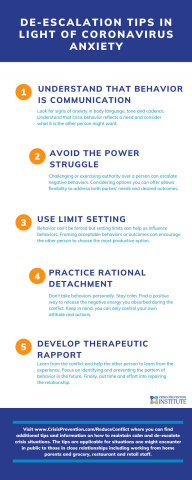MILWAUKEE--(BUSINESS WIRE)--Crisis Prevention Institute, Inc. (CPI), the worldwide leader in evidence-based de-escalation and crisis prevention training, today shared tips and tools to address the urgent public need to anticipate and verbally calm situations before they escalate. The CDC anticipates anxiety and stress levels growing during the coronavirus pandemic. CPI’s offerings come from its extensive professional trainings with healthcare systems, school districts, law enforcement and security firms to safely and effectively de-escalate crises in workplaces around the world.
De-escalation in everyday lives is crucial now as individuals face highly elevated emotions in a variety of situations, according to CPI. These can include interactions in healthcare settings, grocery stores, takeout lines and even in isolation at home as kids and parents navigate challenges of work and school.
“The realities of stress, fear and anxiety are ever present during this pandemic and it can get worse with more social restrictions, economic impacts and uncertainty,” said Tony Jace, CEO of Crisis Prevention Institute. “Learning of heated public exchanges and increasing home isolation, we realized our tools for professionals can be just as critical and helpful to the public in resolving situations influenced by the coronavirus. We felt a strong responsibility to do something positive and believe our expertise can be very helpful during these challenging times.”
CPI is sharing tips to help individuals control their own behavior during heightened stress and anxiety. The five tips everyone can use include:
- Understand that Behavior is Communication: Most communication occurs beyond the words we use. Look for signs of anxiety in body language, tone and cadence. Understand that crisis behavior reflects a need and consider what it is the other person might want.
- Avoid the Power Struggle: No one can meet every need at every moment. Challenging or exercising authority over a person can escalate negative behaviors. Considering options you can offer allows flexibility to address both parties’ needs and desired outcomes.
- Use Limit Setting: Behavior can’t be forced but setting limits can help us influence behaviors. Framing acceptable behaviors or outcomes can encourage the other person to choose the most productive option.
- Practice Rational Detachment: Don’t take behaviors personally. Stay calm. Find a positive way to release the negative energy you absorbed during the conflict. Keep in mind, you can only control your own attitude and actions.
- Therapeutic Rapport: Learn from the conflict and help the other person learn from the experience. Focus on identifying and preventing the pattern of behavior in the future. Finally, put time and effort into repairing the relationship.
Visit www.crisisprevention.com/ReduceConflict where you can find additional tips and information equally relevant to parenting, how to de-escalate a crisis, how to maintain calm and more.
CPI has found that stress, fear and anxiety can impact mental health both short- and long-term. When pressed, these scenarios can cause people’s reactions to escalate and lead to verbal and even physical conflict. This is why CPI instills in its methods the philosophy of care, welfare, safety and security for everyone.
“We know our techniques work in professional settings, but in times like this, they also can be extremely beneficial in our communities,” said Jace. “Our focus is always on the dignity and respect of all the individuals involved and right now those are all things from which our communities can benefit.”
According to CPI, anyone can obtain the skills to avoid escalating situations with others. The most important thing to remember is that behavior influences behavior and one’s actions and attitudes impact the actions and attitudes of those around them.
About Crisis Prevention Institute
Crisis Prevention Institute, Inc. is an international training organization committed to the best practices and safe behavior management methods that focus on prevention. Founded in 1980, it has been their mission to reduce the likelihood and severity of workplace violence incidents. Over 17,000 facilities, 37,000 Certified Instructors and 15 million trained professionals worldwide trust CPI to help create more confident and productive employees.
About De-Escalation Trainings for Healthcare, Education and Other Workplace Settings
Prior to the pandemic, healthcare workers were already experiencing the majority of all occupational violence in the U.S., according to the U.S. Bureau of Labor Statistics. CPI has successfully trained and certified thousands of nurses, physicians and hospital personnel on how to de-escalate and prevent violence during moments of crisis. Additional industries that utilize CPI training for at-risk employees include school districts and universities, elder care facilities, retailers, law enforcement and others. Learn more at www.crisisprevention.com/ReduceConflict.
Media Note:
For interviews and information please contact Alicia Wilson/608-577-4717/alwilson@laughlin.com
Interview soundbites available here.




